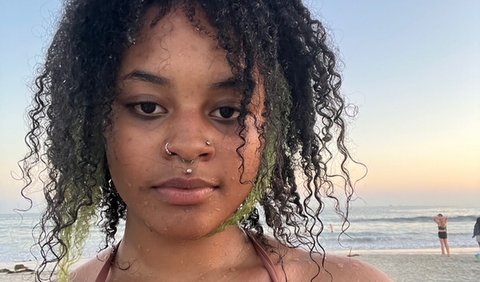
05 Jul A Black Girl and Her Hair: How I Learned Pretty Didn’t Have to Mean Pain

I used to think I needed to hurt myself to fit in and look pretty. Now, at the age of 18, I wear my hair on my terms. (Photo courtesy of Naja Ji Jaga)
Commentary, Naja Ji Jaga
The morning of first grade picture day was the first time a flat iron burned me. Rather than avoiding this pain, I instead continued flat ironing my hair in hopes of fitting in and looking “pretty.” From my perspective as an impressionable Black elementary student, “pretty” meant attributes close to whiteness. So if that meant burning my skin to have straight hair, then so be it.
Hurting ourselves to fit into society is a normalized struggle that all my Black female family members and friends have dealt with at some point in their lives. Most of the Black female population’s earliest memories of our hair are associated with pain.
Of course, having a “bad hair day” is a universal experience that most people go through. However, kinky-haired Black women’s hair struggles are drastically different because the causes are rooted in racist and sexist Eurocentric standards. Unfortunately, this leads to Black women like me having “bad hair days” every day of our lives.
A study conducted by the Arizona State University Department of Psychology looked at how common it is for Black girls to have negative experiences because of their hair.
Researchers asked 105 Black girls aged 10–15 years old open-ended questions about their natural hair and how societal pressures and biases affect how they wear it. They also asked the girls about being bullied and teased because of their hair and how they would define “good hair” and “bad hair.” “Good hair” was “straight,” “soft.” “Bad hair”? Well, it sounded like our hair.
Whenever I wore my hair straightened, I got compliments from friends and strangers, and this act, while not overtly hurtful, still harmed how I viewed my hair. This is because I was treated differently when my hair was not in that style.
Seventh grade was the first time I was finally comfortable enough to wear my natural hair in an afro at school, but I was not greeted with hellos from my peers like I usually was. Instead, I was welcomed with non-consensual touching and comments on my afro. I felt like an animal in a petting zoo, and when I defended my hair, my peers dismissed the concerns I had about their actions. While they did not mean to make me feel this way, it was still a dehumanizing experience that had the power to stop any young girl from embracing their natural hair — so no surprise when that happened to me.
I attempted to hide my afro and hair texture however I could, out of fear of unwanted touching, comments and general hatefulness due to beliefs that my natural hair is inappropriate. And while the people who caused most of my self-consciousness were not Black, these insecurity-invoking beliefs are just as prevalent in the Black community. This is because the United States has trained us as a people to assimilate into anything besides Blackness. The further a person is from whiteness and the more they refuse to conform to the standards maintained, the worse their quality of life is. This is why so many Black girls and I share the same insecurities and feel forced to resort to hurting ourselves with straighteners, perms and more to fit in.
Although it has been a continuous battle to renounce these ingrained beliefs taught to me, I have thankfully built a strong connection to and love and appreciation for my hair. Finding a balance between wearing my hair naturally and not has become empowering since I have the choice to wear my hair however I want. I no longer feel forced to follow an unrealistic beauty standard since I can wear my hair naturally, straightened, in braids or in any other form, on my own terms. Of course, I will still occasionally receive unnecessary comments regarding my natural hair. Still, my understanding that these Eurocentric standards are completely obstructive has helped me stray from falling back into my hair insecurities. I can confidently say that once I released myself from the grips of Eurocentrism, the more secure I became with myself and my hair.






No Comments